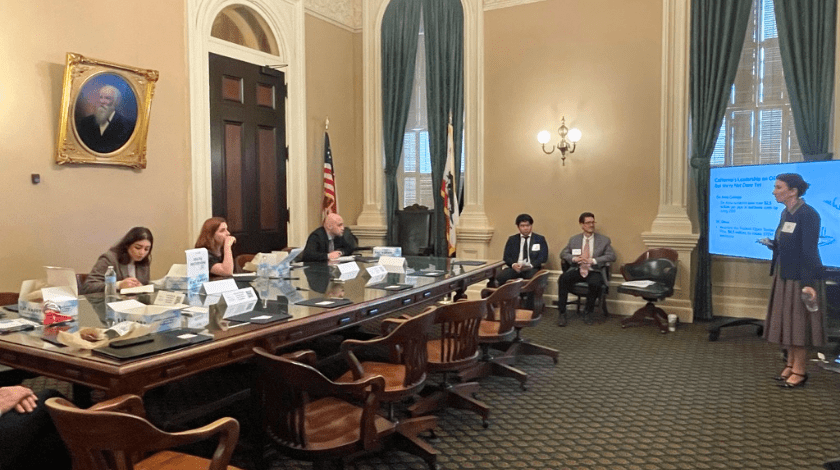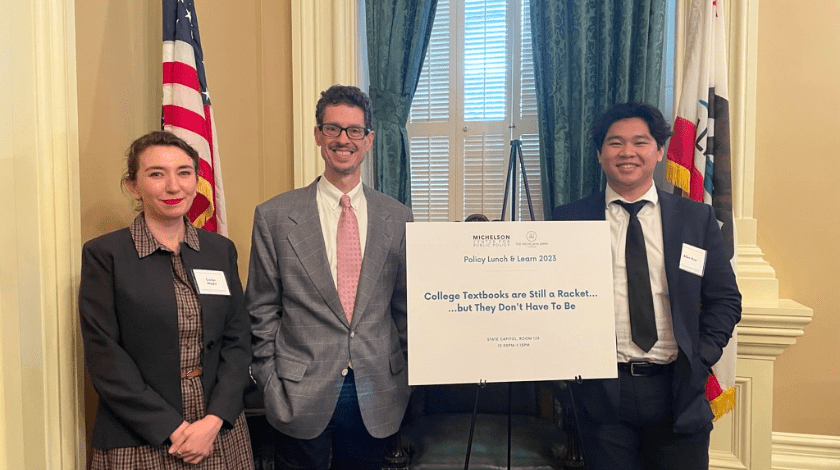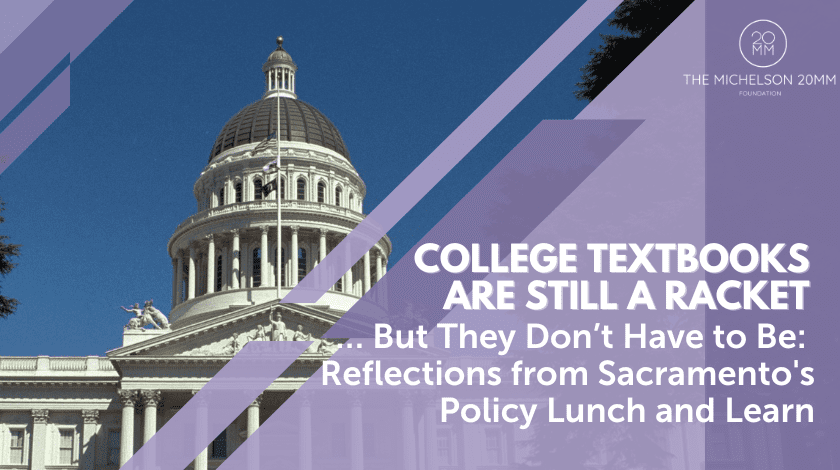By Cailyn Nagle
Students continue to struggle to access their course materials as 63-65% of students report not buying a textbook due to its cost, US PIRG found. At the same time, 25% of students said they needed to work extra hours to afford materials while 11% skipped meals to do so. To underscore the impacts of this issue and shed light on opportunities within the State of California, the Michelson 20MM Foundation was proud to host a Sacramento Lunch and Learn in partnership with the Michelson Center for Public Policy.
“College Textbooks are Still a Racket… but They Don’t Have to Be” sought to bring together legislative staff, administrative, and agency staff with the goal of understanding the new costs that students face, such as homework paywalls and automatic textbook billing. Speakers James Glapa-Grossklag, Dean, College of the Canyons; Cailyn Nagle, OER Program Manager, Michelson 20MM Foundation; and Allen Kuo, Student Trustee, San Diego Community College District, Michelson 20MM Textbook Affordability Fellow also shared how Open Educational Resources (OER) and Zero-Textbook Cost (ZTC) Degree programs are proven solutions to address the challenges.
The Textbook Affordability Landscape
Due to the fact that students are a captured market and that the textbook industry is largely a monopoly, with three companies controlling 80% of the market, traditional supply and demand principles do not apply; as such, based on Bureau of Labor Statistics, college students have seen textbook prices increasing at 3x the rate of inflation from 1970s-2016, and the costs are back on the rise. To circumvent this expense, students historically looked toward used textbooks; however, the publishing companies make this more difficult by issuing new editions each year (with minimal changes), employing digital copies and rentals, making digital copies and physical copies a package deal, and implementing automatic textbook billing. As a result, publishing companies continue to profit while students skip meals to buy their books.

- Cailyn Nagle shares the steps California has taken towards affordability.
Automatic textbook billing, the newest tactic in publishers’ arsenal, comes into play when digital course material content is automatically added to student tuition and fees, the materials must legally be “below market prices,” and students must be given an option to opt out—even with these provisions these deals have raised eyebrows. US PIRG took a deep dive into the reality of automatic textbook billing by reviewing 52 contracts and found that in a significant number of these deals the touted discounts only apply if there’s 95% or greater participation, annual price increases often remain uncapped, and there are restrictions concerning the number of paper copies offered and on how the college or university can inform the public of the deal. Additionally, these deals fail to center the needs of students as some include all or nothing provisions, raising questions that if a student fails to pay the automatically billed fee will they receive their transcript or be able to register for classes? Or what does consent to share their data mean with publishing companies when it was automatically added to their account and access to coursework depends upon acceptance?
Allen, speaking from his experience as a current student, shared how students make difficult decisions each term from skipping buying the things they need to dropping to part time status in order to afford their materials. Students who drop to part time not only face increased costs over the long term, but also are less likely to graduate or transfer.
How California Can Center the Needs of Students and Make Textbooks Affordable–Free, Even
After a robust discussion on the current landscape, the Lunch and Learn shifted gears to explore what is possible for California’s students; namely, cost savings, increased grade point averages, increased degree completion rates, and more culturally relevant materials in the classroom.
By leveraging OER and ZTC programs, the state can eliminate the cost barrier of essential course materials. OER has saved students over $1B–savings that can go towards tuition, childcare, food, housing, and other needs. Additionally, by removing the cost barrier, every student can afford to have a copy of the textbook, which has been found to increase A’s by 5.5% and A-’s by 7.73%, based on a UGA study. Here in California, the 2016 ZTC pilot program demonstrated an overall increase of 3.1% for all students and 7.6% for Pell Grant recipients.
The data exists to prove that using OER in the classroom and implementing ZTC programs is successful and beneficial. California knows this as the 2016 pilot within the Community College system was only a $5M investment that resulted in an 858% ROI as the program saw $42.9M in student savings and 34 ZTCs created, all while improving student success. Outside of the CCCs, California State University (CSU) Channel Islands and the University of California Davis have taken steps towards embracing OER and ZTC, benefiting students on their own campuses and beyond.
Armed with this knowledge, we hope that California will continue to be a leader in supporting the needs of all of their students to access their materials.

- Cailyn Nagle (left), James Glapa-Grossklag (center), and Allen Kuo (right)
Michelson 20MM is a private, nonprofit foundation seeking to accelerate progress towards a more just world through grantmaking, operating programs, and impact investing. Co-chaired and funded by Alya and Gary Michelson, Michelson 20MM is part of the Michelson Philanthropies network of foundations.
To sign up for our newsletter, click here.
